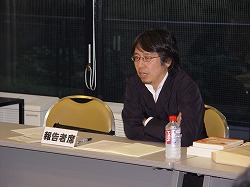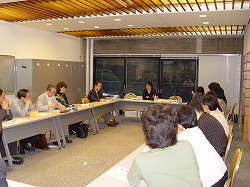2008 Lecture Series, Number Three
“2・1・0: The Structure of Culture and Civilization in East Asia”
Professor OGURA Kizo (Graduate School, University of Kyoto)
Data June 6, 2008 18:30-20:30
Place Ichigaya Campus, Hosei University


Professor Ogura argued that China, Korea and Japan have traditionally recognized their relative positions with regard to culture and civilization as“2・1・0 relations,”in which (2)
symbolizes“civilization”(universal and uninterrupted), (1) symbolizes“culture”(fixed civilization), and (0) symbolizes “non-civilization and non-culture”(neither 2 nor 1). This metaphor facilitates a deeper understanding of the relationship between the three countries.
China has traditionally recognized itself as the center of“(2) civilization,”while Korea has self-defined itself as a follower of (2), i.e. a“(1) culture”within“(2) civilization,”by strongly
embracing Neo-Confucianism (Jp. Shushigaku) to become a “petit Sino-centric”state, with its society valuing Neo-Confucianism more highly than in China.
On the other hand, Japan has tended to recognize itself as a “(0) non-civilization and non-culture”and has deviated away from Chinese civilization. Korea has viewed this as a point for which Japan should be criticized. In contrast, Japan has viewed Korea as a conservative country lacking in originality, persistently limiting itself to“(1) culture.”Japan believes that being free from Chinese civilization enabled it to become the first modernized state in Asia, and this belief has made it even more proud of its“(0) non-civilization and non-culture.”
In summary, Professor Ogura argues Korea and Japanese share this consciousness of their positions vis-a-vis China with regard to culture and civilization. While each has been proud of
its own position, they have been critical of each other’s. It is hoped that this“2・1・0 relations”theory will help overcome mutual misunderstanding by prompting self-awareness of these prejudices.


